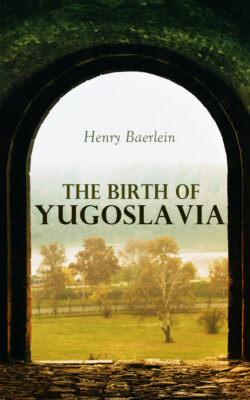Читать книгу The Birth of Yugoslavia - Henry Baerlein - Страница 13
На сайте Литреса книга снята с продажи.
THE SLAVS AND THEIR NEIGHBOURS
ОглавлениеBut the two States formed beside the Adriatic and in Raška were not only separated from early days by their religion; they had quite different neighbours to deal with. In 887 the Croats imposed their will on the Venetians, against whom they had been for some time waging war—and not merely a defensive war—the Venetians having attacked the country in order to despoil it of timber and of people, whom they liked to sell in the markets of the Levant. In 887, however, after the defeat and death of their doge, Pietro Candiano, the Venetians were forced to pay—and paid without interruption down to the year 1000—an annual tribute to the Croats, who in return permitted them to sail freely on the Adriatic. Beside that sea the Croats founded new towns, such as Šibenik (of which the Italian name is Sebenico), and carried on an amicable intercourse with the autonomous Byzantine towns: Iader, the picturesque modern capital which they came to call Zadar and the Venetians Zara; Tragurium, the delightful spot which is their Trogir and the Venetian Traù, and so forth. These friendly relations existed both before 882 and subsequently, when the towns agreed to pay the Croats an annual tribute, in return for which the local provosts were confirmed in office by the rulers of Croatia. We have plentiful evidence from the ruins of royal castles and of the many churches built by the Slavs in this period, as well as from the discoveries of arms and ornaments, that the people had attained to a condition of prosperity. At the beginning of the tenth century, so we are told by the learned emperor and historian Constantine Porphyrogenetos, the Croatian Prince Tomislav could raise 100,000 infantry and 60,000 cavalry; he had likewise eighty large vessels, each with a crew of forty men, at his disposal, and a hundred smaller ships with ten to twenty men in each of them.
As for the State of Raška, protected on the south and west by formidable mountains, and in the very centre of the Serbian tribes, it is there that the lore and customs of the people have survived in their purest form. Raška was the land in which the love of liberty was always kept alive and from there the expeditions used to sally forth whose aim, frustrated many times, it was to found a powerful Serbian State. The chieftain, Tshaslav Kronimirović, did, as a matter of fact, succeed in uniting his State with two others, one being in Bosnia and the other in Zeta, which is now Montenegrin. He even added three other provinces on the Adriatic coast; but after his death the State was dissolved and in the course of the conflicts which followed, the State of Zeta assumed the leadership. It had been necessary for these Serbian rulers of Raška and Zeta to resist the frequent assaults not only of the Byzantines but of the Bulgars.
